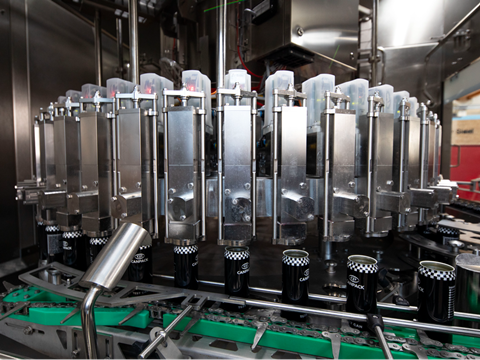
Sidel’s EvoFILL Can Compact filling solution claims to fill up to 40,000 cans of beer, carbonated soft drinks, and other premium beverages every hour, and to offer flexibility and space efficiency for the low-to-medium speed production market.
It is designed for easy installation, operation, and handling via its plug-and-play, compact design. The seamer and process unit have been combined into a single block to maximize space efficiency and minimize its footprint, making the most of limited space while optimizing total cost of ownership (TCO).
Since it is compatible with can formats of up to 500ml and claims to limit standard deviation to +/- 1ml, the machine is thought to offer a ‘high-precision’ filling accuracy and minimize product losses to less than 0.1%. Both CSD and hot fill applications are supported.
Electronically controlled pneumatic valves regulate beverage flow for ‘smooth and consistent’ filling; the machine also incorporates magnetic flowmeters in pursuit of efficient, precise liquid measurement. This is hoped to maximize production efficiency, boosting speed, accuracy, and hygiene, while minimizing waste.
Carbonated soft drinks are filled at ambient temperatures, with Sidel claiming to limit CO2 losses to less than or equal to 0.2 Vol. It places the machine’s monoblock efficiency at 98.5% – a feature expected to minimize downtime and optimize productivity without compromising canning quality.
Once the can has been filled, the seaming machine attached to the filling immediately seals it. This is intended to reduce handling time while improving both speed and hygiene. Seamers have also been integrated into the filler frame.
Adjusting the height of the filling carousel is an automated process, Sidel explains, with changeovers expected to take less than 25 minutes. The integrated enclosure and roof feature HEPA filters and are built into the frame, which keeps the machine compact while maintaining hygiene standards.
Automatic dummy caps are also available to safely clean the machine without human intervention.
“EvoFILL Can Compact extends the range of the well-known EvoFILL Can, offering a highly compact and efficient solution that meets the demands of low-volume premium beverages market,” says Tommaso Tegoni, product manager – Filling at Sidel. “Its ability to accommodate frequent changeovers with minimal downtime, coupled with advanced automation and modular design, ensures reliable, top-tier performance across both carbonated and non-carbonated beverages—including hot fill products—while maintaining speed and precision.”
The solution comes as beverage production volumes are anticipated to rise globally. Non-alcoholic beverage packaging volumes are expected to reach 1.3 trillion units by 2028, while alcoholic beverage packaging is set to reach 492.1 billion units within the same time frame.
Both markets utilize metal packaging in line with increasing consumer preference for smaller, portable, and recyclable beverage cans. Sidel hopes that EvoFILL Can Compact will cater to ‘diverse’ product lines and keep up with SKU proliferation cross the industry.
This development comes after Sidel announced its new bottle washer, Hydra Ultrasonic. The solution combines chemical and ultrasound technologies in hopes of reducing CO2 emissions and water and steam consumption.
Last year, SIG unveiled SIG Prime 55 In-Line Aseptic, a filling system for pre-made, spouted aseptic pouches. The solution targeted in-line pouch sterilization, a simplified supply chain, and lower production costs.
Since then, Syntegon has revealed MLD Advanced, a new filling machine for ready-to-use nested syringes. It claims to fill 400 syringes per minute with 100% in-process control, utilizing aseptic, no-touch transfer and avoiding glass-to-glass contact to maximize hygiene.
If you liked this story, you might also enjoy:
The ultimate guide to the Packaging and Packaging Waste Regulation in 2025
How are the top brands progressing on packaging sustainability?
Everything you need to know about global packaging sustainability regulation in 2025
The key to increasing the use of reusable packaging in supermarkets














No comments yet